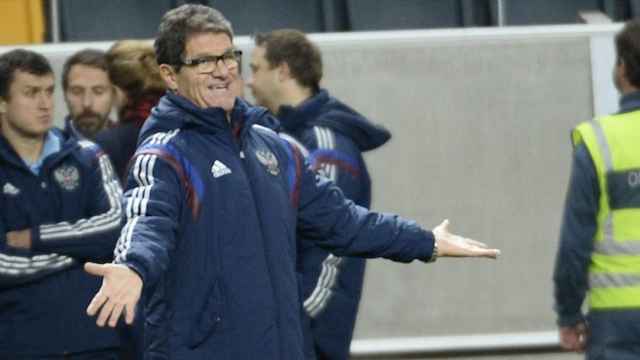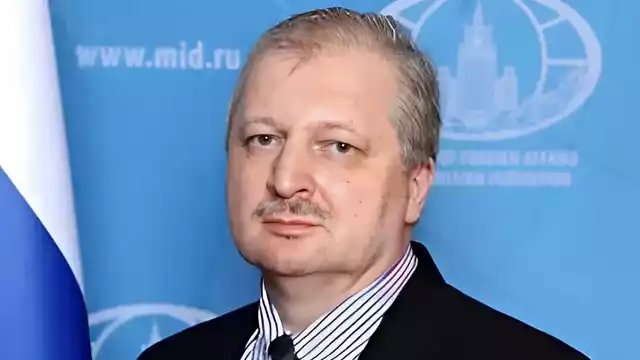LONDON — President Vladimir Putin must demand an end to the racism plaguing Russian football and the country should stop denying it has a problem, the executive director of Football Against Racism in Europe said Wednesday.
Piara Power, who is a member of FIFA's Anti-Discrimination Task Force, stopped short of calling for Russia to be stripped of hosting the 2018 World Cup but feared an African team could walk off the field at those finals unless action was taken now.
"I think the time has come for President Putin and also for the Prime Minister, Dmitry Medvedev, to come out publicly and say enough is enough. This has got to stop," he said.
"If Putin and Medvedev don't come out and talk about these things in a very explicit way we won't see the changes we need to see."
Power envisaged a scenario where an African team, playing in a World Cup match being televised live to hundreds of millions around the world, walked off in the face of racist jeers and taunts from Russian fans.
"It is an absolute possibility that we will have a strong, confident African team that will say, 'we are not taking this, we are leaving regardless of what is at stake — this issue is bigger than this match'," he said.
"The way that Russian fans are behaving at the moment, the place where the debate is at, I can well imagine that happening."
With less than four years to go, Power said there was still much to be done and questioned whether the authorities had the drive to do it.
"What is happening inside stadiums, the far-right involvement, the levels of racism and attacks that are taking place on minorities in and around football stadiums are at levels completely unacceptable in a country that is going to hosting the next World Cup," he said.
Little Change
Power recognized that the Russian Football Union (RFU) had started to impose tougher sanctions but said little had really changed.
SOVA, a Russian-based anti-racism organization, reported last week that there had been 93 cases of racism at Russian stadiums between May 2012 and May of this year.
CSKA Moscow are currently serving a UEFA sanction of playing three Champions League matches behind closed doors because of the continued racism and violence of some of their fans.
Power accused the Russian FA and World Cup organizing committee of lacking co-ordination between themselves while policing was often heavy-handed and the government was not taking a lead.
"What is needed now is a very clear message from government leaders, from Putin and Medvedev to send out the message that racism in football is not something that Russian society will tolerate any longer," he said.
"Right now to me, it looks like a mess. The laws are in place to deal with racism and violence in football in Russian stadiums but those laws are being applied sometimes too stringently, sometimes not at all.
"It needs a reaction from the leadership, especially in Russia where political leadership, in a very hierarchical society, determines so much."
Putin Promise
Power recalled that on the day in December 2010 when FIFA awarded Russia the right to stage the 2018 finals, Putin promised at his first news conference in Zurich following the announcement that racism would not be a problem in Russia.
"He may well maintain that position and that when the World Cup comes around, it will not be a problem, but Russia cannot keep denying it has a problem now," said Power.
"Denial is always the first obstacle, and we face that everywhere, and until they get over the denial then there can be no progress and the sort of measures they need to take. I see this in the organizing committee."
Power said fans, in a big country with stadiums in remote areas, had to be educated now.
"You cannot expect fans in those areas, suddenly to know how to behave in a stadium without being racist if they have not been told to stop," he said.
"Some clubs are beginning to make efforts, including Zenit St. Petersburg whose fans urged the club not to sign black players in 2012.
"But in the main they are paying lip service, they are not getting to the root of the problem at all and time is running out before the next World Cup comes around."
A Message from The Moscow Times:
Dear readers,
We are facing unprecedented challenges. Russia's Prosecutor General's Office has designated The Moscow Times as an "undesirable" organization, criminalizing our work and putting our staff at risk of prosecution. This follows our earlier unjust labeling as a "foreign agent."
These actions are direct attempts to silence independent journalism in Russia. The authorities claim our work "discredits the decisions of the Russian leadership." We see things differently: we strive to provide accurate, unbiased reporting on Russia.
We, the journalists of The Moscow Times, refuse to be silenced. But to continue our work, we need your help.
Your support, no matter how small, makes a world of difference. If you can, please support us monthly starting from just $2. It's quick to set up, and every contribution makes a significant impact.
By supporting The Moscow Times, you're defending open, independent journalism in the face of repression. Thank you for standing with us.
Remind me later.





